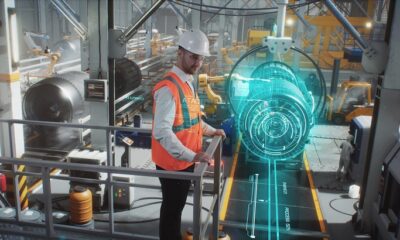Innovation
How 5G Technology Will Transform Construction Sites
It will open up unlimited potential for processing mobile data.

The fifth generation network, 5G, is likely to transform construction in ways we have never seen before, thanks to its speed and ability to handle more connected devices than 4G.
According to research firm GlobalData, 5G has the capacity to facilitate enhanced data flows and faster response times that will improve technologies such as virtual and augmented reality, robotics, and drones, which are now operational within the construction sector.
“In addition to the striking speed, 5G’s ability to connect thousands of such devices at once with lower latency, higher reliability, and lesser battery consumption lays a strong foundation for the effective adoption of emerging technologies,” says GlobalData’s director of disruptive technology Archi Dasgupta.
This will open up unlimited potential for processing mobile data, which will influence the ways in which construction machines communicate and work together remotely.
Real-time processing of data will also improve decision making at construction site – enabling site managers to make decisions almost instantly and to rectify issues quickly.
Here are the possible uses of 5G in construction industry.
1.) Real-time automation
This is a popular segment of construction applications comprising self-directing applications such as robotic masons, cranes, and other appliances that use data from sensors in real-time to initiate specific actions.
Real-time automation is often deployed in applications that require high levels of reliability and security. Construction managers can rely on fast speed 5G network to monitor activities on sites in real-time and to execute remote or autonomous building operations.
2.) Video services
Drones are increasingly finding their way into the modern construction site to take high quality 360-degree videos that can quickly capture and process huge volumes of cinematic information.
This helps supervisors to study the operations of workers on site and take the necessary actions without having to visit the construction site.
Besides, this kind of audio-visual information can be made available to the clients to help them track the progress of the project in real-time.
3.) Vulnerability sensing
Real-time videos and images can help site managers to identify hazards immediately and take action to prevent accidents and injuries.
RELATED: Top 10 Construction Technology Trends to Watch
Videos can particularly help streamline inspections, safety audits, and compliance. Through the help of 5G network, data captured can be automated and analysed in real-time.
4.) Supply chain optimization
Sourcing and delivery of materials is a major challenge for many builders. Autonomous vehicles, RFIDs (a tracking system that uses intelligent bar codes to track items in a store), and other digital tools can help address supply chain issues.
Real-time information on the order status of building materials can help construction managers, contractors, and tradesmen to become more organised – thereby improving productivity on site.
These processes require real-time collaboration that can be made possible by 5G network.
5.) Surveillance
Construction sites are increasingly becoming automated, with self-driving vehicles, sensors that collect and transmit data becoming common features on site.
With the arrival of 5G, these tools will become necessary as builders incorporate technologies such as artificial intelligence to make construction sites safer and more efficient.












